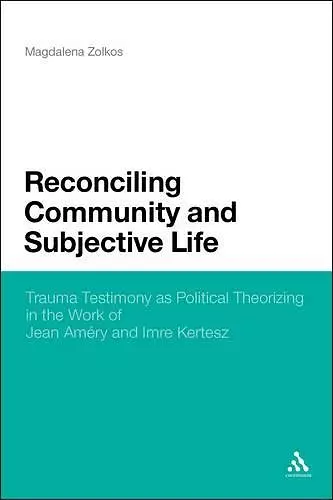Reconciling Community and Subjective Life
Trauma Testimony as Political Theorizing in the Work of Jean Améry and Imre Kertész
Format:Hardback
Publisher:Continuum Publishing Corporation
Published:10th Jun '10
Currently unavailable, and unfortunately no date known when it will be back

Examines issues of transitional justice and reconciliation from a critical, political theory perspective rarely applied in this area of study.
An examination of the difficult interplay between the collective pursuit of justice and reconciliation and the individual subjective experience of trauma on the other, proposing that it be thought as a potentially productive tension. It looks at how texts from Jean Amery and Imre Kertesz speak to the question of the politics of the past.This is an examination of the difficult interplay between the collective pursuit of justice and reconciliation on one hand and the individual subjective experience of trauma on the other, proposing that it be thought as a potentially productive tension. To do so, Zolkos looks at how texts from Jean Amry and Imre Kertsz speak to the question of the politics of the past and, ultimately, to the post-foundational notions of community and justice. The text works with issues of reconciliation at a theoretical level that bring together insights from political theory, trauma studies, holocaust studies, history and literary theory. The book has the greatest relevance for the critical reconciliation theory, as well as for those working on the concept of community within the continental tradition.
Reconciling Community and Subjective Life offers a careful and profound investigation of the testimonial address by Jean Améry and Imre Kertész. Zolkos' book is not an easy read, but if we live, as it has been suggested, in the era of the witness, it is indispensable and deeply thought-provoking. It offers a much needed and highly qualified corrective to current debates on trauma and subjectivity, resentment and reconciliation. --Thomas Brudholm, Associate Professor, University of Copenhagen. Author of Resentment's Virtue: Jean Améry and the Refusal to Forgive.
Magdalena Zolkos's absorbing study of Améry and Kertész delivers a long-awaited challenge to established paradigms of reading Holocaust testimonials. Bringing the discourse of testimony under the scrutiny of poststructuralist thought, psychoanalytic theory and trauma studies, this masterful and rigorous analysis reveals not only the ethical but also the political significance of testimonial literature in "post-catastrophic" times. -- Dorota Glowacka, University of King's College, London
Magdalena Zolkos' Reconciling Community and Subjective Life crucially adds to the current scholarship on Jean Améry's and Imre Kertész's writings in particular and Shoah testimony more generally by amplifying the specifically dialogic character of the affective legacies that irreversibly striate the imaginaries survivors convene in response to catastrophe. As her reading of Améry suggests, the resentment that permeates memories of persecution and torture may engender fantasies of reconciliation that formally exaggerate and ironically expose their own fundamental impossibility. Haunted by the shame of living on "in place of another," Kertész's work, in Zolkos' interpretation, illuminates an implacable sense of proximity with those who did not survive the Holocaust that marks out the ethical and political space of what she calls a "thanatic community." Zolkos contends that a potentially unavowable longing for community traverses Améry's and Kertész's testaments to the irremediable wounds left behind by large-scale betrayals of vulnerability. Anyone who has been immersed in the literature of extreme trauma over the past fifteen years will doubtless find Zolkos' rich analysis intellectually challenging and even startling in the best sense. -- Karyn Ball, Associate Professor of English and Film Studies at the University of Alberta, Canada
ISBN: 9780826431141
Dimensions: unknown
Weight: unknown
256 pages